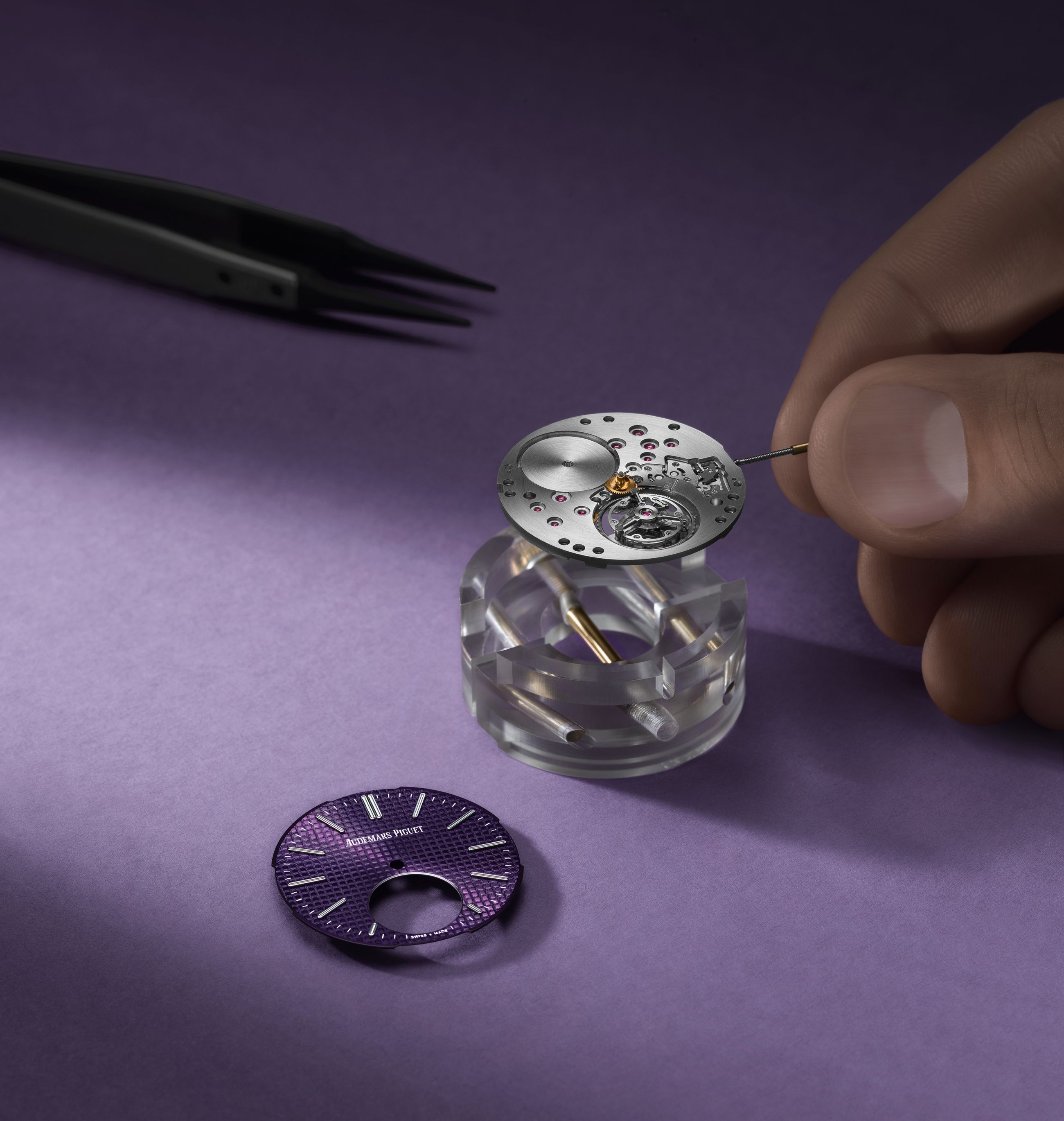Audemars Piguet Royal Oak Selfwinding Flying Tourbillon Extra-Thin (RD#3) in 37mm
Audemars Piguet is delighted to unveil its latest Royal Oak Selfwinding Flying Tourbillon Extra-Thin (RD#3) model. This 37 mm anniversary model, which complements the 39 mm “Jumbo” timepiece released earlier this year, pushes the limits of the Manufacture’s craft one step further. For the first time, the company introduces a flying tourbillon in this smaller diameter making it available to the slenderer wrists thanks to its latest ultra-thin selfwinding flying tourbillon movement, Calibre 2968, which measures a mere 3.4 mm in thickness and adorns a combination of traditional and contemporary hand-decorations. Enriched with an innovative escapement and an unprecedented plum dial, this timepiece interweaves technical complexity with aesthetic details for extreme refinement, while paying tribute to the brand’s legacy of small and mid-sized complicated timepieces.
An innovative ultra-thin flying tourbillon movement
At the heart of this innovation is Calibre 2968, an ultra-thin selfwinding flying tourbillon movement that was developed over a five-year period. Integrating a flying tourbillon powered by an innovative escapement in a case of 39 mm and then 37 mm in diameter represents the Manufacture’s main technical achievement as this complication was previously reserved for 41 mm diameters. Given the restricted space available, this selfwinding flying tourbillon had to be creatively rethought to reduce its thickness, while retaining the initial proportions of its cage, leading to the repositioning of certain components. The tourbillon cage, which is crafted in titanium, is notably equipped for the first time with a peripheral drive, which also contributes to its thinness. ¹ The combination of these two elements makes the distribution of energy to the tourbillon more fluid in addition to lightening and refining this regulating organ. In addition, the new escapement relies on an oscillator with increased amplitude that enhances reliability, energy distribution and precision.
In order to provide optimum visibility of both the flying tourbillon and the movement, Audemars Piguet engineers completely redesigned the architecture of the mechanism. On the caseback side, the bridges have been openworked to unveil the movement’s inner workings, while achieving a harmonious and symmetrical aesthetic. On the dial side, the geometry and positioning of the balance wheel arms have been modified to make the beating heart even more perceptible. The technical design of the movement results in the flying tourbillon being placed at the dial level, for a greater visual experience.
The hand decoration of the movement components, visible through the sapphire caseback, combines the dynamism and classicism of V-angles with the modernity of traits tirés – a finish that appears on the mainplate and bridges and replaces the traditional Côtes de Genève. The openworked, rhodium-toned bridges offer an unobstructed view on the contrasting pink-gold-toned elements of the mechanism.
¹ The tourbillon cage’s peripheral drive enables to reduce the tourbillon’s thickness and gain a level, thus making it possible to fit it into the extra-thin “Jumbo” case. This solution also improves energy transmission as the smaller angular pitch provides more constant energy distribution.
Our first goal was to adapt the flying tourbillon to the exact dimensions of the original “Jumbo” case. Then, we challenged ourselves further by fitting the same calibre in a 37 mm case. This technical constraint required us to rethink the totality of the flying tourbillon cage, in which we included a new escapement.
A fine aesthetic inspired by "Jumbo" codes
Although endowed with a smaller diameter, the second RD#3 version integrates the dial aesthetic codes of the “Jumbo” model released earlier this year. Similarly to its 39 mm counterpart, the timepiece adorns a Petite Tapisserie dial, but presented for the first time in a vivid plum hue, obtained by Chemical Vapour Deposition (CVD) to guarantee a light, homogeneous and lasting hue across all dials.
Inspired by the original model from 1972, this new reference also encompasses bathtub-shaped hour-markers and hands with a luminescent coating for optimum legibility in the dark. The “Audemars Piguet” signature, as well as the minute track, has been printed in white onto the Tapisserie motif. Rotating at 6 o’clock, the titanium flying tourbillon cage provides a sharp contrast with the plum background, creating a mesmerising aerial effect.
Departing from Jumbo aesthetics, the hand-finished stainless steel case and bracelet of this 37 mm model incorporate the collection’s latest design evolution which was introduced at the beginning of the year on numerous Royal Oak models. The widened polished bevels and the increase taper of the bracelet links bestow the timepiece with a slenderer silhouette, while reinforcing its ergonomics.
A dedicated "50-Years" oscillating weight
The Royal Oak Selfwinding Flying Tourbillon Extra-Thin features a central oscillating weight mounted on ball bearings and equipped with two reversers ² that ensure bidirectional winding. This dedicated rhodium-toned 22-carat pink gold rotor, specifically developed for the Royal Oak’s 50th anniversary, bears the “50-years” logo and the Audemars Piguet signature engraved on its surface. Matching the tones of the stainless steel case and bracelet, it is adorned with the collection’s trademark polished and satin-brushed finishes that can be admired through the sapphire caseback.
² In a selfwinding movement, dedicated reversers (reverser wheels) convert the bidirectional movement of the oscillating weight into a unidirectional rotation to wind the spring
A tradition of technical prowess
In 1986, Audemars Piguet introduced the world’s first selfwinding tourbillon wristwatch. Imagined by Jacqueline Dimier, the design placed the tourbillon escapement on the dial side for the very first time. Calibre 2870 was housed in an ultra-thin case measuring a mere 5.3 mm thick. Its titanium tourbillon cage remains one of the smallest in the world today with a diameter of 7.2 mm, as well as one of the lightest with a weight of only 0.123 grams. This model became known as the Tourbillon Selfwinding Ra (in reference to the Egyptian sun god) because Jacqueline Dimier’s design gave the tiny regulator the appearance of a sun, with its rays spreading across the dial. This complicated wristwatch, of which 401 were produced until 1992, opened up a new avenue for Haute Horlogerie, which began to see a comeback of prestigious mechanisms including tourbillon watches.
Thirty years after Jacqueline Dimier’s model, the Manufacture, known for its ability to innovate, launched a series of Research and Development models. In 2015, Audemars Piguet revealed its first RD#1 Royal Oak Concept Minute Repeater Supersonnerie prototype at SIHH, after eight years of research in partnership with EPFL, the Swiss Federal Institute of Technology Lausanne and a panel of experts composed of watchmakers, engineers, musicians and sound specialists. This watch marked a significant step forward in terms of acoustic performance, sound amplification and sonic beauty, with the launch of the Supersonnerie mechanism. ³ This system, for which three patents were filed, combines a novel chiming mechanism with an innovative case construction. The commercial Royal Oak Concept Minute Repeater Supersonnerie version, which followed one year later, won the “Mechanical Exception Watch Prize” at the 2016 Grand Prix d’Horlogerie de Genève.
³ The Supersonnerie, thus named by Audemars Piguet, confers a sound intensity usually associated with pocket watches. The acoustic power, sound quality and harmonic tones of the Supersonnerie are ensured by patented gongs and case architecture.
In 2019, Audemars Piguet unveiled a new innovation with its 41 mm Royal Oak Selfwinding Perpetual Calendar Ultra-Thin, whose prototype was presented a year earlier at SIHH under the name RD#2. This 6.3 mm-thick calendar watch houses a movement that is only 2.89 mm thick, making it the world’s thinnest automatic calendar wristwatch of its time. To achieve this feat, the calendar functions usually mounted on three levels were brought together on a single plane. The Manufacture’s experts also developed two patented innovations relating to the integration of the end-of-month cam with the date wheel and the association of the month cam with the month wheel. Marking a turning point in the history of complication watches, the Royal Oak Selfwinding Perpetual Calendar Ultra-Thin earned Audemars Piguet the “Aiguille d’Or” award at the Grand Prix d’Horlogerie de Genève in November 2019.
This year, the Manufacture’s latest technical advance, the Royal Oak Selfwinding Flying Tourbillon Extra-Thin, follows in the footsteps of these previous innovations. The two RD#3 timepieces, powered by the new Calibre 2968, combine technical innovation and aesthetic refinement to pay a fine tribute to the Royal Oak’s 50th anniversary.
Technical specifications
Audemars Piguet Royal Oak Selfwinding Flying Tourbillon Extra-Thin (RD#3) 37 mm
Reference: 26660ST.OO.1356ST.01
Case
- Material: Stainless steel
- Diameter: 41 mm
- Thickness: 8.1 mm
- Glass: Glareproofed sapphire crystal and caseback
- Water-resistant to 50 meters
Dial and hands
- Plum dial with Petite Tapisserie pattern
- White gold applied hour-markers and Royal Oak hands with luminescent coating.
Movement
- Selfwinding Calibre 2968
- Diameter: 29.6 mm (13 lignes)
- Thickness: 3.4 mm
- Number of parts: 226
- Number of jewels: 33
- Frequency of balance wheel 3 Hz (21,600 vibrations/hour)
- Minimum power reserve guaranteed 50 hours
Functions/Indications
- Flying tourbillon, hours, minutes.
Strap and buckle
- Stainless steel bracelet with AP folding clasp.
MSRP: Price on request
For more information, please visit audemarspiguet.com











Comments
Leave a comment